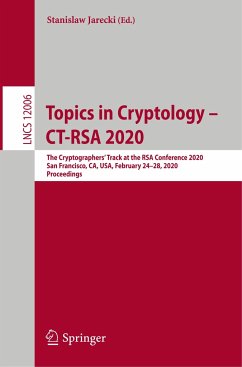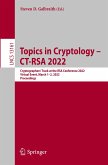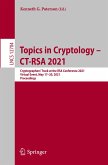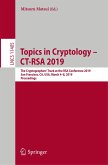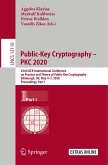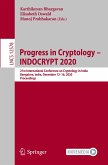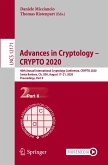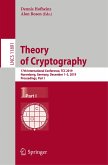Topics in Cryptology ¿ CT-RSA 2020
The Cryptographers¿ Track at the RSA Conference 2020, San Francisco, CA, USA, February 24¿28, 2020, Proceedings
Herausgegeben:Jarecki, Stanislaw
Topics in Cryptology ¿ CT-RSA 2020
The Cryptographers¿ Track at the RSA Conference 2020, San Francisco, CA, USA, February 24¿28, 2020, Proceedings
Herausgegeben:Jarecki, Stanislaw
- Broschiertes Buch
- Merkliste
- Auf die Merkliste
- Bewerten Bewerten
- Teilen
- Produkt teilen
- Produkterinnerung
- Produkterinnerung
This book constitutes the refereed proceedings of the Cryptographer's Track at the RSA Conference 2020, CT-RSA 2020, held in San Francisco, CA, USA, in February 2020.
The 28 papers presented in this volume were carefully reviewed and selected from 95 submissions.
CT-RSA is the track devoted to scientific papers on cryptography, public-key to symmetric-key cryptography and from crypto-graphic protocols to primitives and their implementation security.
Andere Kunden interessierten sich auch für
![Topics in Cryptology ¿ CT-RSA 2022 Topics in Cryptology ¿ CT-RSA 2022]() Topics in Cryptology ¿ CT-RSA 202281,99 €
Topics in Cryptology ¿ CT-RSA 202281,99 €![Topics in Cryptology ¿ CT-RSA 2021 Topics in Cryptology ¿ CT-RSA 2021]() Topics in Cryptology ¿ CT-RSA 202188,99 €
Topics in Cryptology ¿ CT-RSA 202188,99 €![Topics in Cryptology ¿ CT-RSA 2019 Topics in Cryptology ¿ CT-RSA 2019]() Topics in Cryptology ¿ CT-RSA 201937,99 €
Topics in Cryptology ¿ CT-RSA 201937,99 €![Public-Key Cryptography ¿ PKC 2020 Public-Key Cryptography ¿ PKC 2020]() Public-Key Cryptography ¿ PKC 202038,99 €
Public-Key Cryptography ¿ PKC 202038,99 €![Progress in Cryptology ¿ INDOCRYPT 2020 Progress in Cryptology ¿ INDOCRYPT 2020]() Progress in Cryptology ¿ INDOCRYPT 202074,99 €
Progress in Cryptology ¿ INDOCRYPT 202074,99 €![Advances in Cryptology ¿ CRYPTO 2020 Advances in Cryptology ¿ CRYPTO 2020]() Advances in Cryptology ¿ CRYPTO 2020113,41 €
Advances in Cryptology ¿ CRYPTO 2020113,41 €![Theory of Cryptography Theory of Cryptography]() Theory of Cryptography37,99 €
Theory of Cryptography37,99 €-
-
-
This book constitutes the refereed proceedings of the Cryptographer's Track at the RSA Conference 2020, CT-RSA 2020, held in San Francisco, CA, USA, in February 2020.
The 28 papers presented in this volume were carefully reviewed and selected from 95 submissions.
CT-RSA is the track devoted to scientific papers on cryptography, public-key to symmetric-key cryptography and from crypto-graphic protocols to primitives and their implementation security.
The 28 papers presented in this volume were carefully reviewed and selected from 95 submissions.
CT-RSA is the track devoted to scientific papers on cryptography, public-key to symmetric-key cryptography and from crypto-graphic protocols to primitives and their implementation security.
Produktdetails
- Produktdetails
- Lecture Notes in Computer Science 12006
- Verlag: Springer / Springer International Publishing / Springer, Berlin
- Artikelnr. des Verlages: 978-3-030-40185-6
- 1st ed. 2020
- Seitenzahl: 708
- Erscheinungstermin: 30. Januar 2020
- Englisch
- Abmessung: 235mm x 155mm x 38mm
- Gewicht: 1054g
- ISBN-13: 9783030401856
- ISBN-10: 3030401855
- Artikelnr.: 58437707
- Herstellerkennzeichnung
- Books on Demand GmbH
- In de Tarpen 42
- 22848 Norderstedt
- info@bod.de
- 040 53433511
- Lecture Notes in Computer Science 12006
- Verlag: Springer / Springer International Publishing / Springer, Berlin
- Artikelnr. des Verlages: 978-3-030-40185-6
- 1st ed. 2020
- Seitenzahl: 708
- Erscheinungstermin: 30. Januar 2020
- Englisch
- Abmessung: 235mm x 155mm x 38mm
- Gewicht: 1054g
- ISBN-13: 9783030401856
- ISBN-10: 3030401855
- Artikelnr.: 58437707
- Herstellerkennzeichnung
- Books on Demand GmbH
- In de Tarpen 42
- 22848 Norderstedt
- info@bod.de
- 040 53433511
Generic Attack on Iterated Tweakable FX Constructions.- Universal Forgery Attack against GCM-RUP.- My Gadget Just Cares For Me - How NINA Can Prove Security Against Combined Attacks.- Modeling Memory Faults in Signature and Authenticated Encryption Schemes.- Cryptanalysis of the Multivariate Encryption Scheme EFLASH.- FPL: White-Box Secure Block Cipher Using Parallel Table Look-Ups.- Extending NIST's CAVP Testing of Cryptographic Hash Function Implementations.- A Fast Characterization Method for Semi-invasive Fault Injection Attacks.- Tightly Secure Two-Pass Authenticated Key Exchange Protocol in the CK Model.- Symmetric-key Authenticated Key Exchange (SAKE) with Perfect Forward Secrecy.- TMPS: Ticket-Mediated Password Strengthening.- Overdrive2k: Efficient Secure MPC over Z2k from Somewhat Homomorphic Encryption.- Consensus from Signatures of Work.- Faster homomorphic encryption is not enough: improved heuristic for multiplicative depth minimization of Boolean circuits.- Better Bootstrapping for Approximate Homomorphic Encryption.- Improved Secure Integer Comparison via Homomorphic Encryption.- Efficient FPGA Implementations of LowMC and Picnic.- Traceable Ring Signatures with Post-quantum Security.- Post-Quantum Provably-Secure Authentication and MAC from Mersenne Primes.- Another look at some isogeny hardness assumptions.- How to Construct CSIDH on Edwards Curves.- Policy-Based Sanitizable Signatures.- Traceable Inner Product Functional Encryption.- One-More Assumptions Do Not Help Fiat-Shamir-type Signature Schemes in NPROM.- Cut-and-Choose for Garbled RAM.- Universally Composable Accumulators.- A Non-Interactive Shu e Argument With Low Trust Assumptions.
Generic Attack on Iterated Tweakable FX Constructions.- Universal Forgery Attack against GCM-RUP.- My Gadget Just Cares For Me - How NINA Can Prove Security Against Combined Attacks.- Modeling Memory Faults in Signature and Authenticated Encryption Schemes.- Cryptanalysis of the Multivariate Encryption Scheme EFLASH.- FPL: White-Box Secure Block Cipher Using Parallel Table Look-Ups.- Extending NIST's CAVP Testing of Cryptographic Hash Function Implementations.- A Fast Characterization Method for Semi-invasive Fault Injection Attacks.- Tightly Secure Two-Pass Authenticated Key Exchange Protocol in the CK Model.- Symmetric-key Authenticated Key Exchange (SAKE) with Perfect Forward Secrecy.- TMPS: Ticket-Mediated Password Strengthening.- Overdrive2k: Efficient Secure MPC over Z2k from Somewhat Homomorphic Encryption.- Consensus from Signatures of Work.- Faster homomorphic encryption is not enough: improved heuristic for multiplicative depth minimization of Boolean circuits.- Better Bootstrapping for Approximate Homomorphic Encryption.- Improved Secure Integer Comparison via Homomorphic Encryption.- Efficient FPGA Implementations of LowMC and Picnic.- Traceable Ring Signatures with Post-quantum Security.- Post-Quantum Provably-Secure Authentication and MAC from Mersenne Primes.- Another look at some isogeny hardness assumptions.- How to Construct CSIDH on Edwards Curves.- Policy-Based Sanitizable Signatures.- Traceable Inner Product Functional Encryption.- One-More Assumptions Do Not Help Fiat-Shamir-type Signature Schemes in NPROM.- Cut-and-Choose for Garbled RAM.- Universally Composable Accumulators.- A Non-Interactive Shu e Argument With Low Trust Assumptions.

